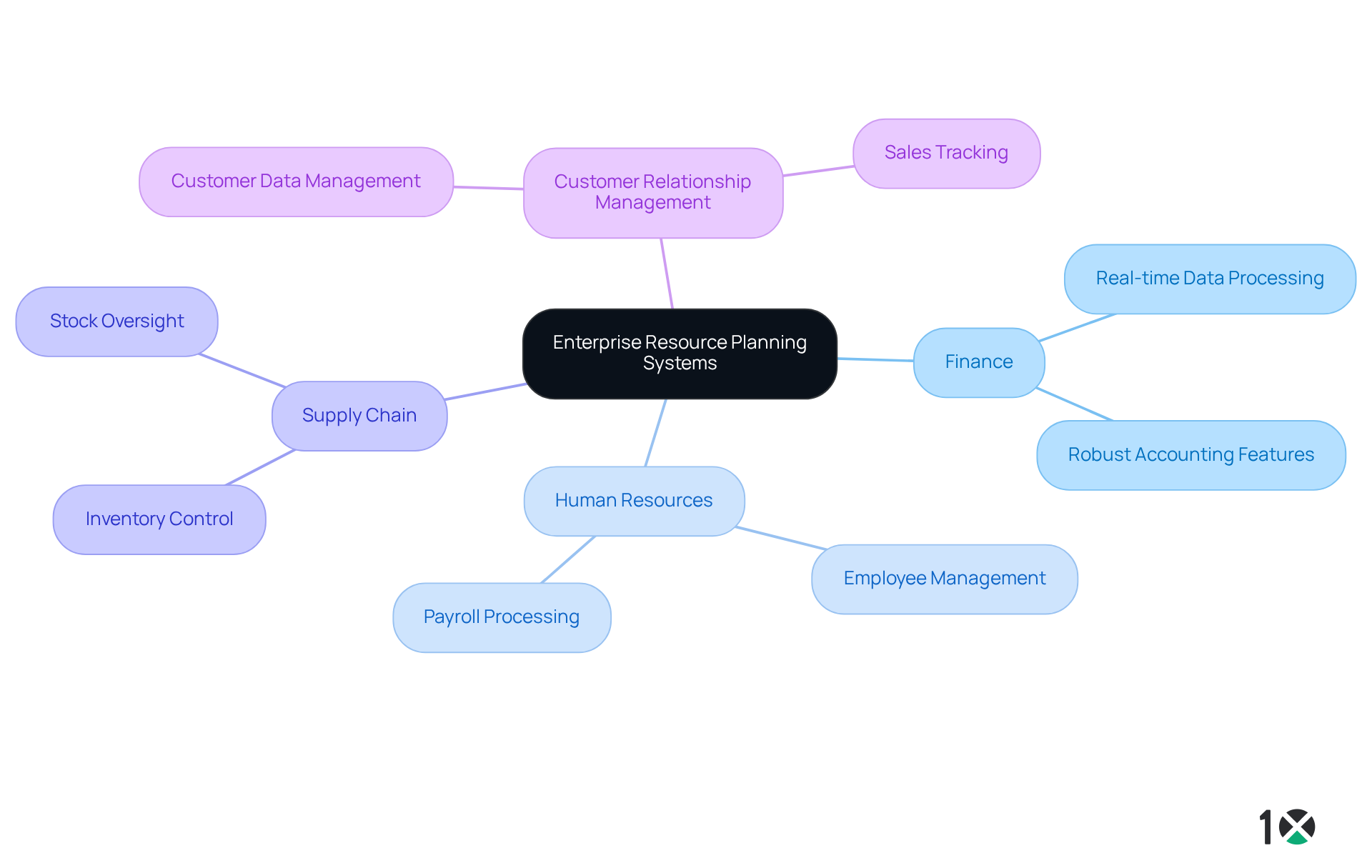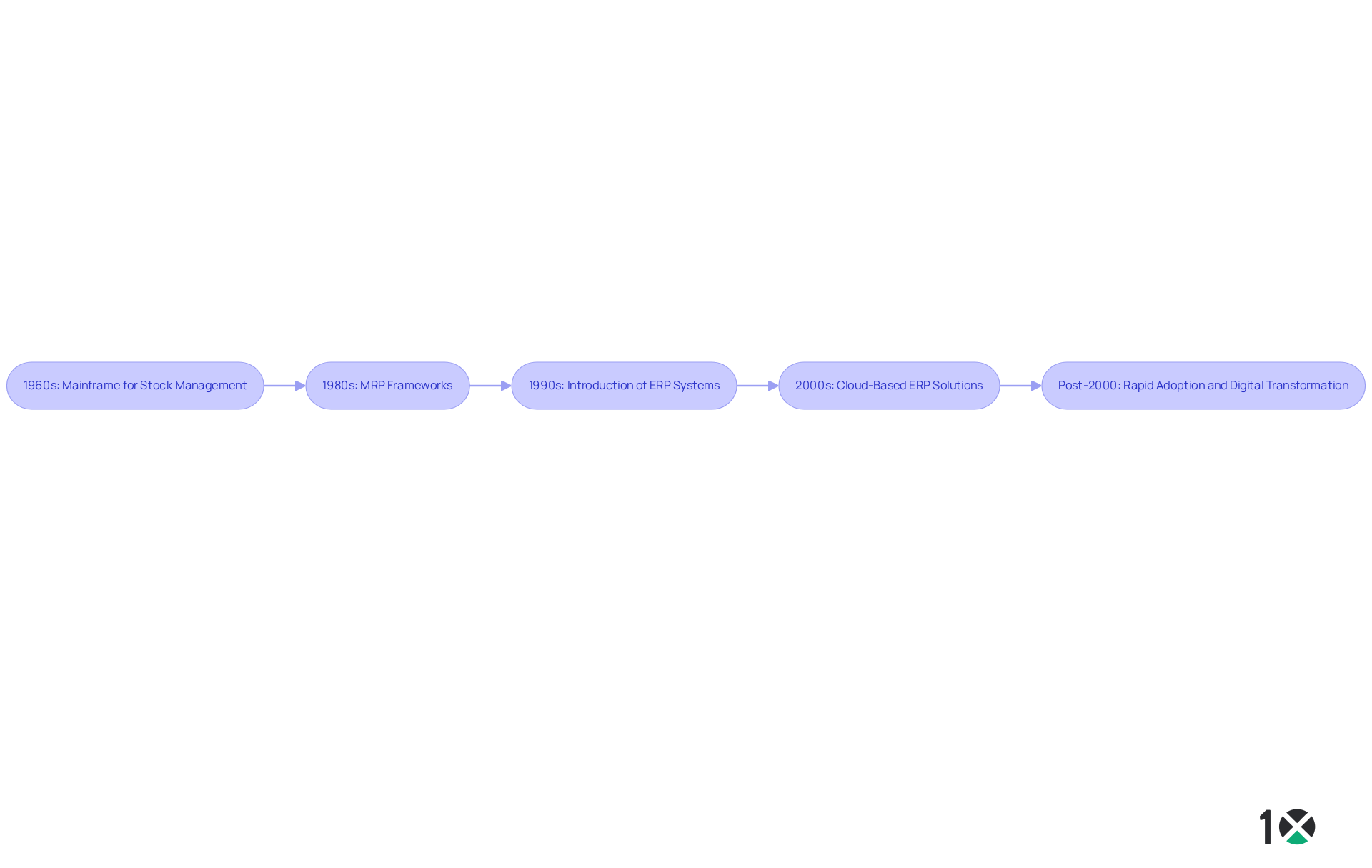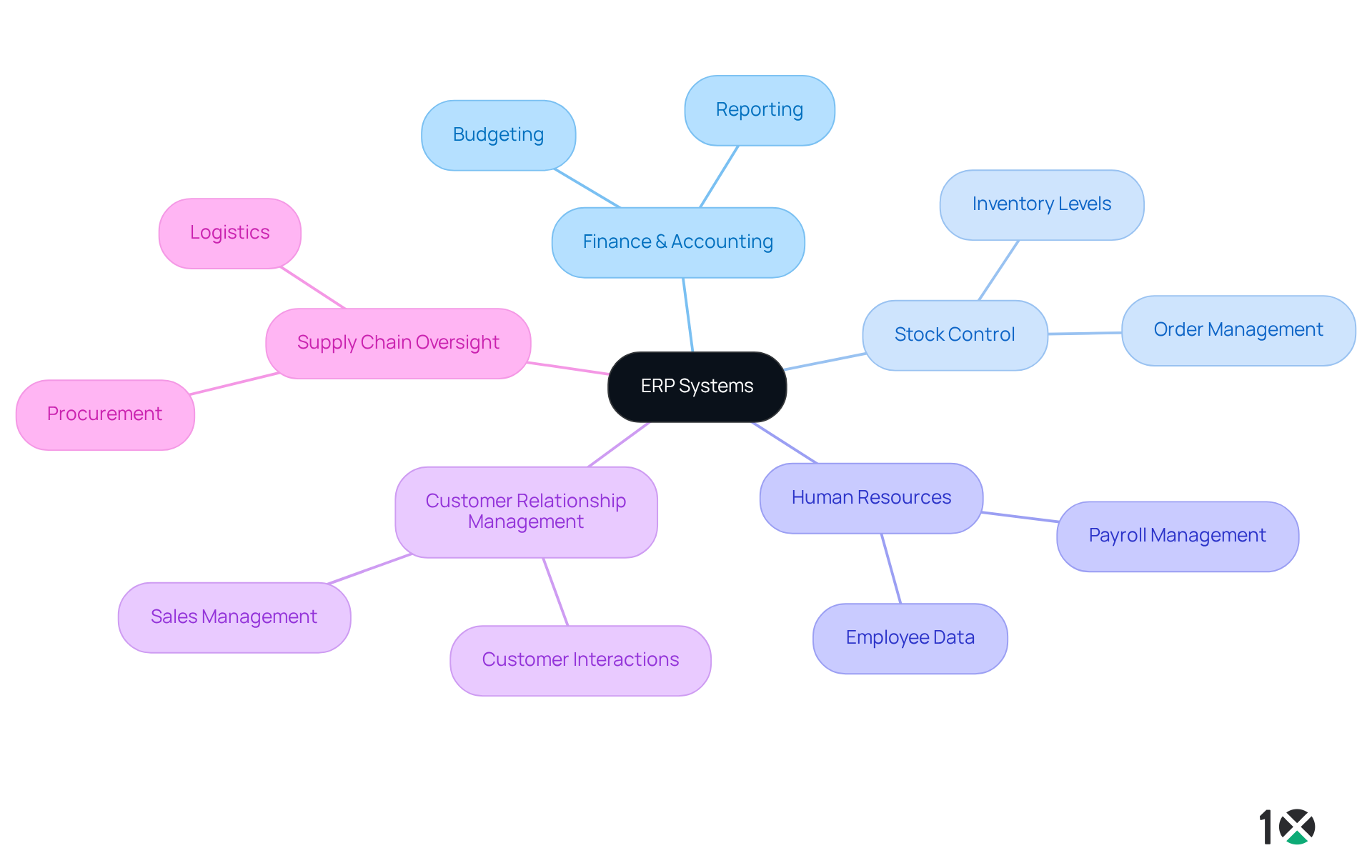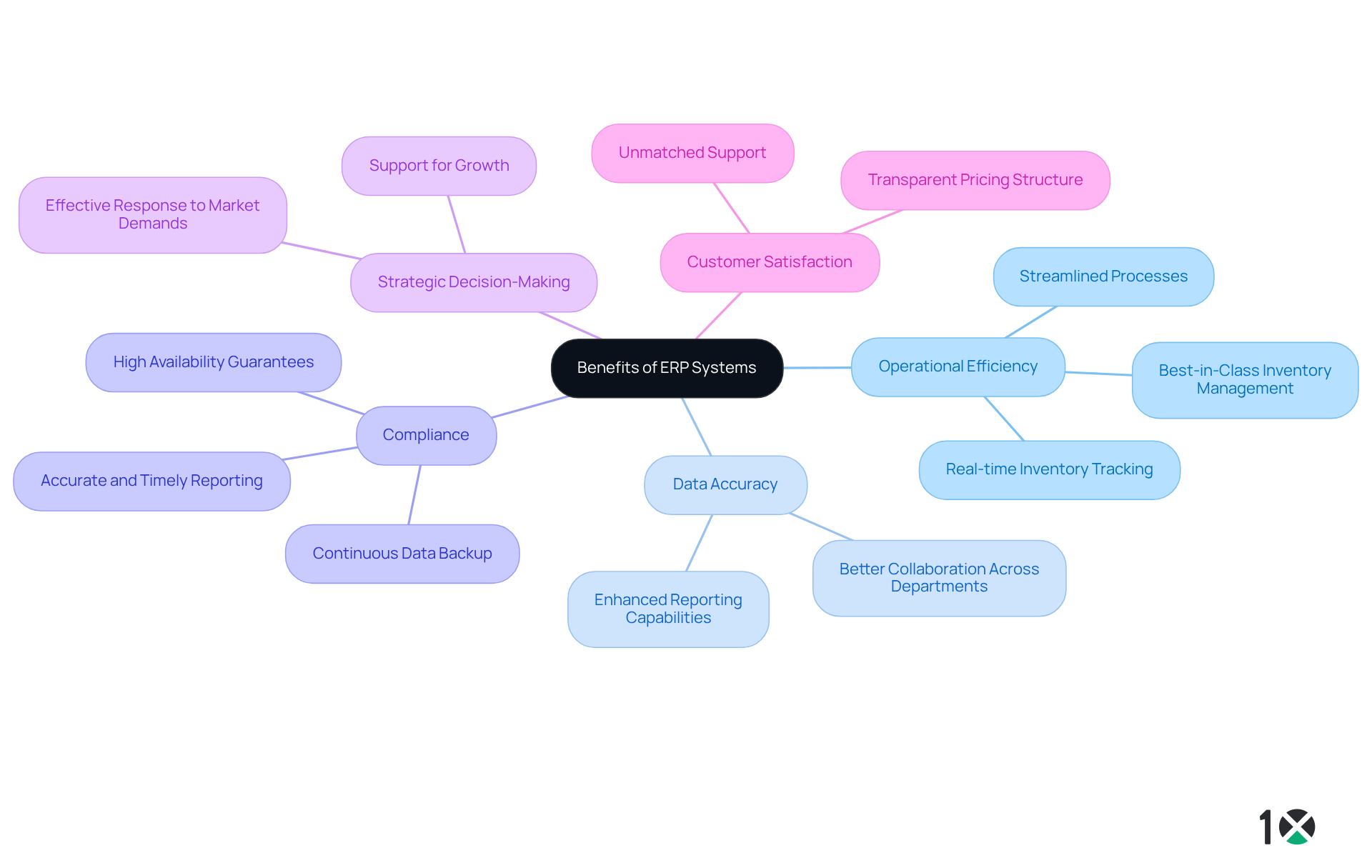Overview
Enterprise Resource Planning (ERP) systems stand as integrated software platforms that organizations utilize to manage and automate critical business processes across various departments, including finance, human resources, and supply chain management. These systems are not just tools; they are essential for enhancing operational efficiency and informed decision-making. By consolidating information and providing real-time data access, ERP systems empower organizations, particularly within the distribution sector, to operate more effectively. As such, embracing ERP technology is crucial for any organization aiming to thrive in today’s competitive landscape.
Introduction
Enterprise Resource Planning (ERP) systems have become integral to modern business operations, serving as the backbone for managing critical processes across various departments. These sophisticated platforms not only streamline workflows but also enhance decision-making through real-time data access and integrated functionalities. However, as organizations increasingly adopt these systems, a pressing question arises: how can businesses effectively leverage ERP solutions to gain a competitive edge in an ever-evolving market?
Exploring the definition, key components, and benefits of ERP systems reveals the transformative potential they hold for organizations striving for operational excellence.
Define Enterprise Resource Planning Systems
What is enterprise resource planning systems? They are integrated software platforms that organizations employ to manage and automate essential business processes across various departments. These frameworks not only consolidate information but also enhance processes by providing a cohesive perspective of critical business functions such as finance, human resources, supply chain, and customer relationship management. With 10X ERP, distributors benefit from cloud-based solutions that deliver real-time data processing, robust accounting features, and reliable stock oversight.
The platform’s API-first strategy ensures seamless integration with existing software, thereby improving operational efficiency and facilitating informed decision-making. Additionally, 10X ERP offers customizable features and tracking functionalities for inventory control, enabling companies to manage their supplies with precision. By facilitating real-time data access and collaboration, ERP solutions like 10X ERP demonstrate what is enterprise resource planning systems, making them indispensable resources for organizations of all sizes, particularly in the distribution sector.
In conclusion, understanding what is enterprise resource planning systems and adopting a comprehensive ERP solution is not just a strategic move but a necessary step toward enhanced operational effectiveness and competitive advantage.

Trace the Evolution of ERP Systems
The development of ERP solutions began in the 1960s, utilizing mainframe computers for stock management and accounting tasks. In the 1980s, Material Requirements Planning (MRP) frameworks emerged, focusing on production planning and inventory control. The 1990s marked a significant advancement with the introduction of what is enterprise resource planning systems, which allowed for the integration of various business functions into a unified platform, facilitating improved data sharing and collaboration across departments.
With the advent of cloud computing in the 2000s, ERP platforms transitioned into cloud-based solutions, providing organizations with enhanced flexibility, scalability, and accessibility. This transformation has proven especially advantageous for growing distributors, allowing them to streamline operations and respond rapidly to market demands.
Since 2000, the growth of cloud-based ERP solutions has been extraordinary, raising questions about what is enterprise resource planning systems, as reflected in a notable increase in adoption rates that aligns with a broader trend towards digital transformation in business processes. Historical case studies illustrate the successful transition from MRP to ERP frameworks, highlighting the advantages of integrated solutions in boosting operational efficiency and enhancing decision-making.

Identify Core Components and Functions of ERP Systems
The key elements of what is enterprise resource planning systems typically include modules for finance and accounting, stock control, human resources, customer relationship management (CRM), and supply chain oversight. Each module serves a distinct purpose:
- The finance module manages budgeting and reporting.
- Stock control oversees inventory levels and orders.
- Human resources handles employee data and payroll.
- CRM focuses on customer interactions and sales.
- Supply chain oversight streamlines procurement and logistics.
By integrating these components, ERP solutions demonstrate what is enterprise resource planning systems, offering a holistic view of business operations that empowers organizations to make informed decisions and respond swiftly to market changes.
In the realm of 10X ERP, these modules are enhanced with cloud-based solutions that facilitate real-time data processing and improve inventory management. This advancement enables distributors to optimize their operations and better respond to market demands. By leveraging these sophisticated tools, organizations can not only enhance efficiency but also gain a competitive edge in an ever-evolving business landscape.

Examine the Benefits and Importance of ERP Systems
The advantages of adopting ERP solutions, particularly 10X ERP, are both numerous and significant. Improved operational efficiency is achieved through streamlined processes, while enhanced data accuracy and reporting capabilities foster better collaboration across departments. For example, a distributor utilizing 10X ERP can track inventory levels in real-time, thereby reducing the risk of stockouts and overstocking, all while benefiting from best-in-class inventory management features.
Furthermore, 10X ERP ensures compliance with regulatory requirements by providing accurate and timely reporting, bolstered by continuous data backup and high availability guarantees. Ultimately, what is enterprise resource planning systems is significant because they have the capacity to support strategic decision-making, drive growth, and enhance customer satisfaction. This is accomplished by enabling businesses to respond effectively to market demands, all while enjoying a transparent pricing structure and unmatched support throughout their ERP journey.

Conclusion
Enterprise Resource Planning (ERP) systems serve as pivotal tools that integrate various business processes into a cohesive platform, enabling organizations to operate with enhanced efficiency. By understanding and implementing these systems, businesses can streamline operations, improve data accuracy, and foster collaboration across departments, ultimately securing a competitive edge in their markets.
This article explores the evolution of ERP systems, tracing their journey from inception in the 1960s to the contemporary cloud-based solutions like 10X ERP. It highlights the core components of ERP systems—finance, inventory, human resources, CRM, and supply chain management—each playing a critical role in facilitating informed decision-making. Moreover, the benefits of adopting ERP solutions are emphasized, demonstrating how they can drive operational efficiency, ensure compliance, and enhance customer satisfaction.
In today’s rapidly evolving business landscape, embracing ERP systems is not merely advantageous; it is essential for growth and sustainability. Organizations are urged to tap into the transformative potential of these systems, particularly as they navigate the complexities of modern operations. Investing in an effective ERP solution like 10X ERP can lead to significant improvements in organizational effectiveness, positioning companies to thrive amid shifting market demands.
Frequently Asked Questions
What are enterprise resource planning systems?
Enterprise resource planning systems are integrated software platforms used by organizations to manage and automate essential business processes across various departments, providing a cohesive perspective of critical functions like finance, human resources, supply chain, and customer relationship management.
How do enterprise resource planning systems benefit distributors?
Distributors benefit from cloud-based solutions like 10X ERP, which offer real-time data processing, robust accounting features, and reliable stock oversight, enhancing operational efficiency and decision-making.
What is the API-first strategy in 10X ERP?
The API-first strategy in 10X ERP ensures seamless integration with existing software, which improves operational efficiency and facilitates informed decision-making within organizations.
What customizable features does 10X ERP offer?
10X ERP provides customizable features and tracking functionalities for inventory control, enabling companies to manage their supplies with precision.
Why are ERP solutions important for organizations?
ERP solutions like 10X ERP are important because they facilitate real-time data access and collaboration, making them indispensable resources for organizations of all sizes, especially in the distribution sector.
What is the strategic significance of adopting an ERP solution?
Adopting a comprehensive ERP solution is a necessary step toward enhanced operational effectiveness and gaining a competitive advantage in the market.
